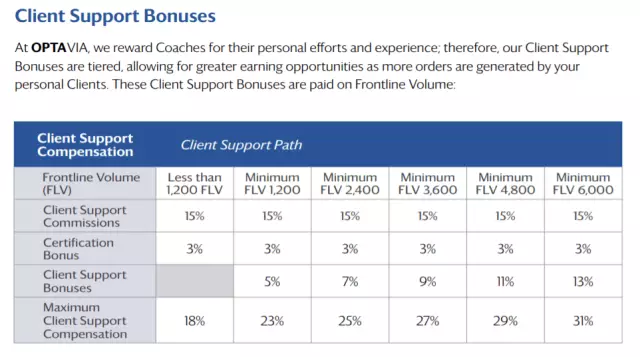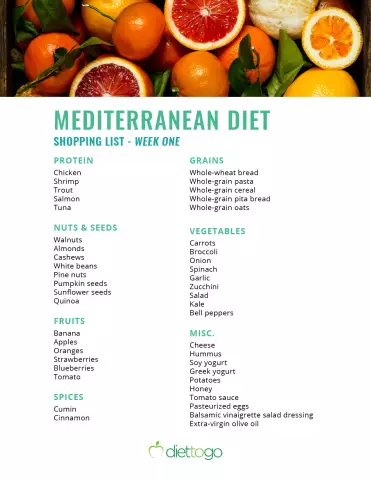- Author Rachel Wainwright [email protected].
- Public 2024-01-15 19:51.
- Last modified 2025-11-02 20:14.
90-day diet
The 90 Day Diet is a split food system. Many people like it, because it allows them not to completely abandon their favorite food, including sweets.
The diet is perfect for those who need to get rid of a lot of extra pounds without harm to their health. Obese people have impaired metabolism, and it is the separate nutrition that helps to establish it. In addition to the fact that this diet is considered beneficial in itself and promotes weight loss, the effect of the diet is increased by reducing the calorie content of the daily menu.
The diet of the 90 Day Diet is based on repeating a four day cycle. Each day of the cycle is dedicated to one type of food - protein, starchy, carbohydrate, vitamin (fruit) days.
The 90 Day Diet Rules:
- lunch should be no earlier than noon. If you have a feeling of severe hunger, and the time for the meal has not yet come, you can eat some kind of fruit, but no later than 30 minutes before the main meal;
- the interval between lunch and dinner should be at least three hours, and on a protein day - at least four hours;
- you cannot eat after 20.00;
- on a vitamin day, food should be eaten every 2-3 hours;
- on a protein day, you should not eat different types of protein foods, for example, meat and eggs, meat and dairy products, eggs and dairy products;
- every 29th day (after fruit) should be unloading, during the day they only drink water. Then comes the protein day again;
- control the amount of portions. For lunch, eat a regular portion, and for dinner - half as much;
- cook food by boiling, stewing, baking, steaming or grilling (without oil);
- to control the calorie content of the diet, it is recommended to count calories at the beginning of the diet (maximum 2000 kcal per day), this is especially important on carbohydrate days;
- every day you need to drink about 2 liters of clean non-carbonated water;
- During the diet, it is advisable to exercise regularly.
To achieve the effect of the diet, it is important to follow all recommendations strictly for 90 days, any deviations can lead to a slowdown in weight loss and a quick return of the lost pounds.
It is worth weighing yourself and measuring your volumes before starting a diet. By observing the results, it will be easier to stick to the rules and avoid breakdowns, as motivation will appear. If a breakdown does occur, you should continue the diet from the missed day.
If, after the 90-day diet, you continue to practice separate meals, the weight will gradually decrease and further until it is completely normalized, and then it will be maintained at this level.

Benefits of the 90 Day Diet
A 90-day diet helps you lose 2-4 kg per week. The more the initial weight, the faster the extra kilograms go away, as the plumb line approaches normal rates, the plumb line slows down.
The 90-day diet is good for those who need to shed significant weight, measured in tens of kilograms.
Separate food, which is the basis of the 90-day diet, experts consider the most healthy and correct from the point of view of physiology.
Three months of the diet ensures the formation of new, healthy eating habits, which helps to normalize weight, prevent re-gain and improve the body's health.
With a variety of diets on a 90-week diet, menus can be made funnier by avoiding repetitive meals.
Disadvantages and contraindications of the 90-day diet
This system has no disadvantages and absolute contraindications, but people with chronic diseases should consult with their doctor before starting a diet and form a menu based on his recommendations.
What foods are allowed?
The 90-day diet consists of four-day cycles. Each day of the cycle is dedicated to one type of food.
On protein days, the following are allowed:
- meat (any low-fat varieties);
- bird (without skin);
- fish (any fresh);
- eggs;
- dairy and lactic acid products;
- vegetables low in starch, greens.
On starchy days, the following are allowed:
- whole grain and rye bread;
- rice and porridge on the water - buckwheat, millet, oatmeal;
- legumes;
- any vegetables, including potatoes.
The diet of carbohydrate days is:
- whole grain and rye bread;
- baking from yeast-free dough;
- pasta;
- porridge on the water;
- low-fat sweets (dark chocolate, honey, marshmallows, marmalade, preserves, oatmeal cookies, etc.);
- vegetables;
- fruit.
Allowed foods for vitamin days:
- fruits, berries, dried fruits;
- seeds and nuts;
- freshly squeezed fruit and vegetable juices (juicing is considered a separate meal).
Vegetable oil and lemon juice are used for salad dressing.
It is allowed to use spices, but it should be borne in mind that most of them stimulate the appetite.
All days you can drink black and green tea, black coffee.
What foods are prohibited?
Every day of the 90 Day Diet, all foods that are not on the list of allowed for a particular day are prohibited.
In addition, fatty, salty, smoked dishes, fast food, confectionery (except for those that are allowed on a carbohydrate day) are prohibited.
It is allowed to use sugar in sweets only on a carbohydrate day, on other days it is prohibited. Sugar is not added to drinks.
It is advisable to exclude salt. If it is difficult to do this, it is acceptable in small quantities.
90 Day Diet Menu
Sample protein day menu for a 90-day diet:
Sample protein day menu:
Sample menu for a starchy day:
Sample carbohydrate day menu:
Vitamin (fruit) day menu:
* On this day, there should be more than three meals, in between you can eat any fruits, compotes, freshly squeezed fruit juices.
Useful Tips
Tip 1. Those who do not like sweets can replace them with crackers during the carbohydrate day.
Advice 2. If you do not want to eat a lot of fruits on a vitamin day, some of them can be replaced with fresh vegetables.
| Diet characteristic | final grade |
| Duration: 90 days |
4 out of 5 Adhering to the recommendations of the diet, in three months it will be possible not only to lose weight and improve health, but also to develop new, healthy eating habits, thanks to which the weight will be reduced to normal values after the diet is completed. |
| Recommended frequency: once a year | |
| Weight loss rate: | |
| Safety: | |
| Variety of products: |
YouTube video related to the article:
Found a mistake in the text? Select it and press Ctrl + Enter.






